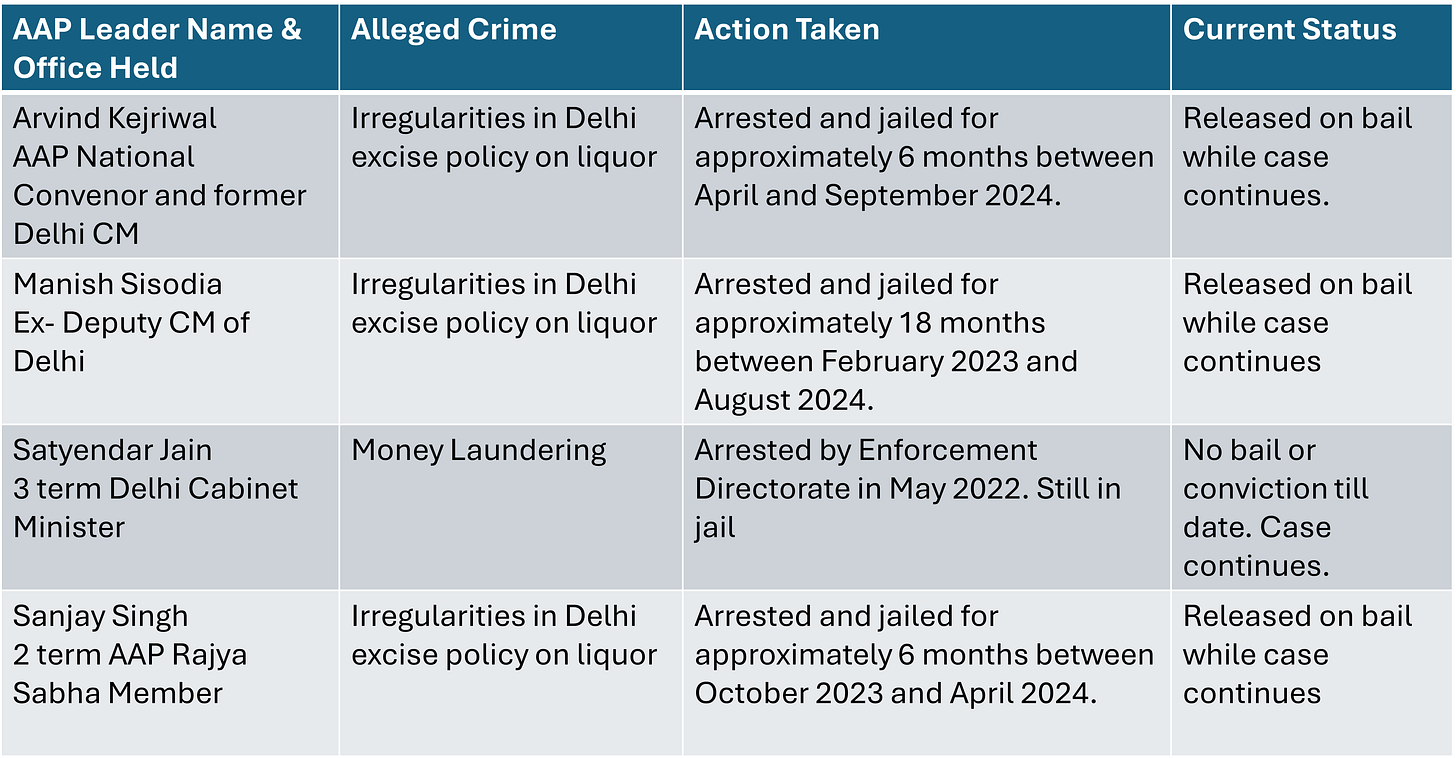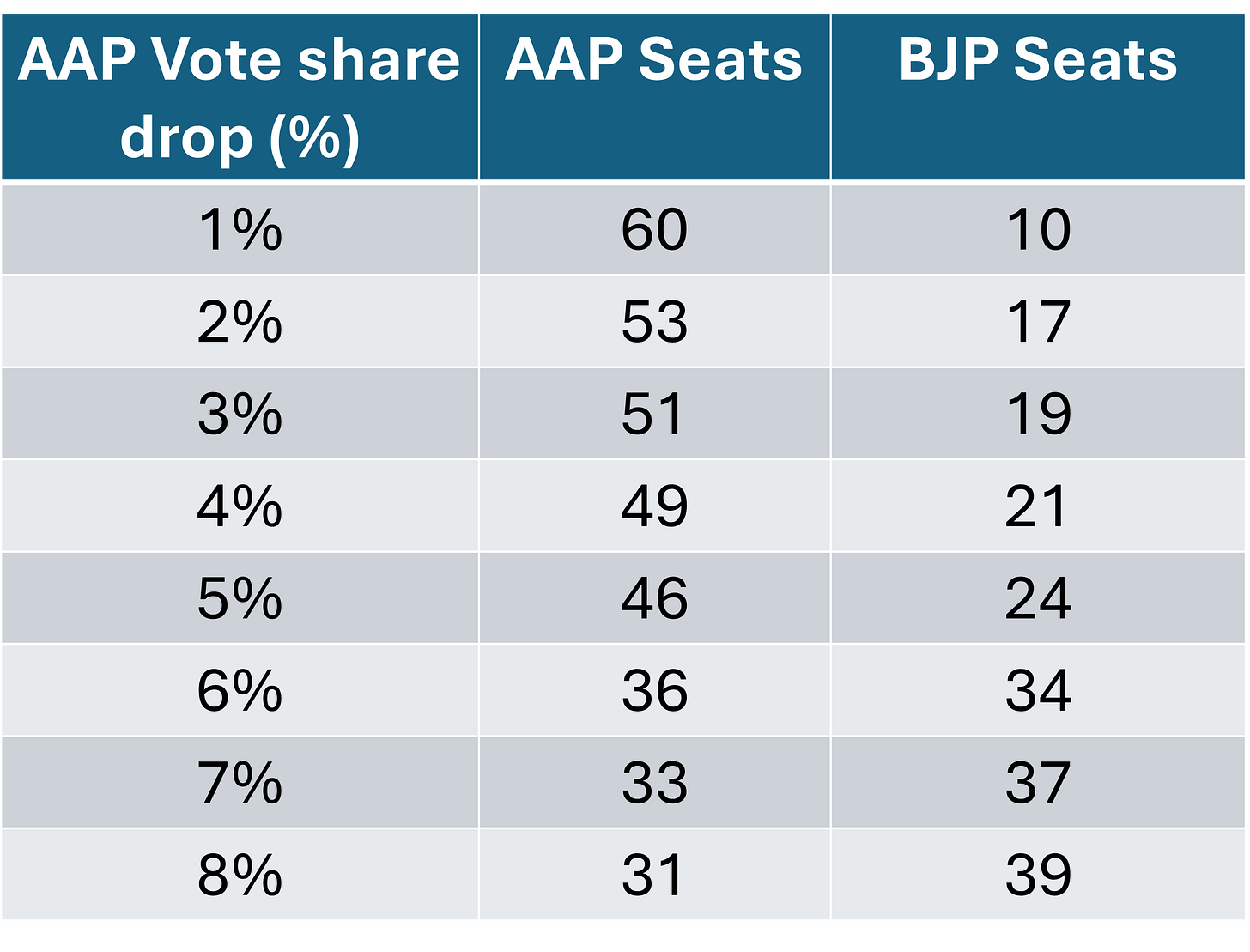Capital Control
Can BJP wrest power in Delhi?
I apologise for the hiatus in my writing due to personal commitments. I aspire to be more regular in the coming year that has elections scheduled in Delhi and Bihar.
Background
Delhi originally had a 48 member legislative assembly as per the Government of Part C states Act, 1951 (with legislative powers). However, the States Reorganisation Act of 1956 made Delhi into a Union Territory under the direct control of the President of India.
The Delhi Administration Act of 1966 gave the capital a Metropolitan Council with 56 elected and 5 nominated members under the Lt. Governor, albeit in an advisory role with no legislative powers. This council was replaced by the Delhi Legislative Assembly following the 69th Constitutional Amendment in 1991. BJP won the first assembly in 1993 and served its full term. Six further assembly elections have been conducted since.
The INC won the 2nd,3rd and 4th assembly elections ruled for 15 years under Sheila Dikshit. After a fractured mandate in 2013, the newly formed Aam Aadmi Party (AAP) came to power with INC outside support. However, the government lasted for less than 50 days and after nearly a year of President’s rule, fresh elections were held for the sixth assembly in early 2015. The AAP won landslide majorities in both the 2015 and 2020 elections and has been in power for 10 years. The table below shows the seats won by political formations in the 7 elections held till date. (Total seats=70)
The following can be seen from the above:
The BJP has never been in power after 1998. It came close in 2013 but could not form a government.
The INC has declined dramatically since 2013 and not won any seats in the last 2 elections.
The AAP has dominated state politics in the last 2 assembly elections
A vote share analysis of these elections reveals a more nuanced picture, as below:
We can infer the following from the chart
The BJP has maintained a consistent vote share of between 30-40% in the last 6 elections despite losing all of them, indicating a stable support base.
Since 2013, the INC's vote percentage has steadily declined, reaching single digits in 2020.
AAP's vote share growth virtually matches INC's loss, demonstrating a lot of overlap in support. However, the AAP cannot further extend its voting base at INC expense, since INC vote share has reached a low level.
Another interesting facet is that Delhi votes very differently in central and state elections. This is evident from the data below:
Vote Share in categories of elections (in %)
Note: AAP and INC fought 2024 LS elections together as part of the INDIA bloc.
We can infer the following from the above:
The BJP gains 15% vote share in Lok Sabha (LS) elections but returns to its long-term norm of 35-40% in Vidhan Sabha (VS). This 15% vote transfers to the AAP in the Vidhan Sabha elections.
The AAP won a majority of seats in the 2022 Delhi Municipal Corporation (DMC) local body elections, even though the BJP and AAP were close in vote share.
Comparison of 2020 and 2022 figures shows the INC gains vote share nearly completely at the expense of the AAP.
Key events shaping the current election
Cloud over the clean image of AAP
Four prominent leaders of the AAP were jailed on corruption allegations in the last 2 years (see table below). After his detention and subsequent bail conditions, Arvind Kejriwal resigned as CM to make way for Atishi.
These arrests could dent AAP's image, which was created in the wake of the Anna Hazare led anti-corruption movement. According to C Voter surveys, the public is skeptical of central agency probes' neutrality, hence these agency actions may have limited influence.
Since the BJP has fueled the ‘Sheesh Mahal’ scandal, the high expenditure on the Delhi CM's official residence has come under scrutiny. Since this contradicts the AAP's common man image, it could hurt its reputation.
INC resurgence
The INC seems determined to reverse its decadal slide in Delhi politics. It has announced candidates for over 50 seats and indicated its intentions to compete separately (it entered the 2024 LS polls alongside the AAP in Delhi). Due to its shrill campaign, especially against the AAP, any INC vote gain will directly impact the AAP. Since the AAP enjoys a 12% vote share lead over the BJP, INC can hurt AAP prospects only if it wrests a large vote share from AAP. However, the INC decision to ally with AAP in the 2024 LS elections make this an unlikely possibility.
Difecta with AAP:
Most voters seem to prioritise local issues like water supply, roads, electricity and healthcare, that fall under the purview of the Delhi Municipal Corporation. Since 2022, the AAP controls the DMC and cannot blame the BJP or the Centre anymore for DMC shortcomings.
No big bang welfare schemes
The last 2 assembly elections saw large scale welfare measures announced and partly implemented before the election. For instance, AAP promised to halve Delhi residents’ electricity bills in 2015 and to bring affordable healthcare at the doorstep of citizens in 2020. However, no such big bang scheme has been implemented this time around although a new Mahila Samman Yogana that promises to pay Rs. 2100 per month to Delhi women has been announced. The BJP has been careful in declaring that no existing welfare scheme will be withdrawn and hopes that it can dispel the voter fear that only the AAP can deliver on welfare measures. The INC and BJP will likely match the AAP's welfare promises, thus no party will have a clear edge.
Prior post poll data indicates that women back the AAP (60%) more than the BJP (35%). Therefore, women centric welfare measures may help the AAP retain women voters. The current election outcome will hinge on the women vote.
Party Strengths and Weaknesses
Projections
Delhi has 10 seats with >20% Muslim population. I expect the AAP to win all of these due to minority consolidation. Rajouri Garden, Hari Nagar, Tilak Nagar, and Mundka have considerable Sikh populations. I expect at least three seats will go to AAP.
BJP holds 7 and AAP 49 of the remaining 56 seats. The AAP victory margin in 2020 Vidhan Sabha elections to these 49 seats is as follows:
From the above, we can see that in 16 seats, the AAP is vulnerable if there is a 5% vote share swing against it. A more detailed swing analysis (assuming BJP retains its existing 8 seats and AAP vote share drop accrues fully to the BJP) shows:
As shown above, the BJP needs a 6%+ vote share swing to win the elections. As of now, I think the AAP is seeing a 4-5% swing against it, giving it a 45-25 victory. However, if vote share swings another 1% against it, AAP seats will plummet and a near deadlock will follow.
Thus, I expect the BJP to launch a high-voltage campaign to gain votes and the AAP to reach out to social groups to retain them in the next three weeks. In the coming weeks, the CMs of Haryana, Punjab, Uttarakhand, Uttar Pradesh, and Bihar will likely canvass migrant votes in the capital. JDU and LJP support may be crucial for BJP in select seats where Bihari origin voters are numerous. The union budget should make for interesting reading specifically on women centric schemes, since it will be presented 4 days before Delhi polls.











It's the illegal aliens from across the borders who have been given voter id, aadhar, pan by the likes of muffler rat and dirty didi. Unless the govts reign on these dirty scums from across the borders, the true vote base can never be ascertained. Broadly I concur on your analysis though. I feel BJP has a better chance this time. Ppl have to wake up and help govt identify the illegals and kick them into the shit hole the crept out from.
Unfortunately, it's the freebies that it announced by these filthy swindling parties who go scott free.
Ultimately it's the tax payers who is being made a scape goat. Unless PPL change , no one can help